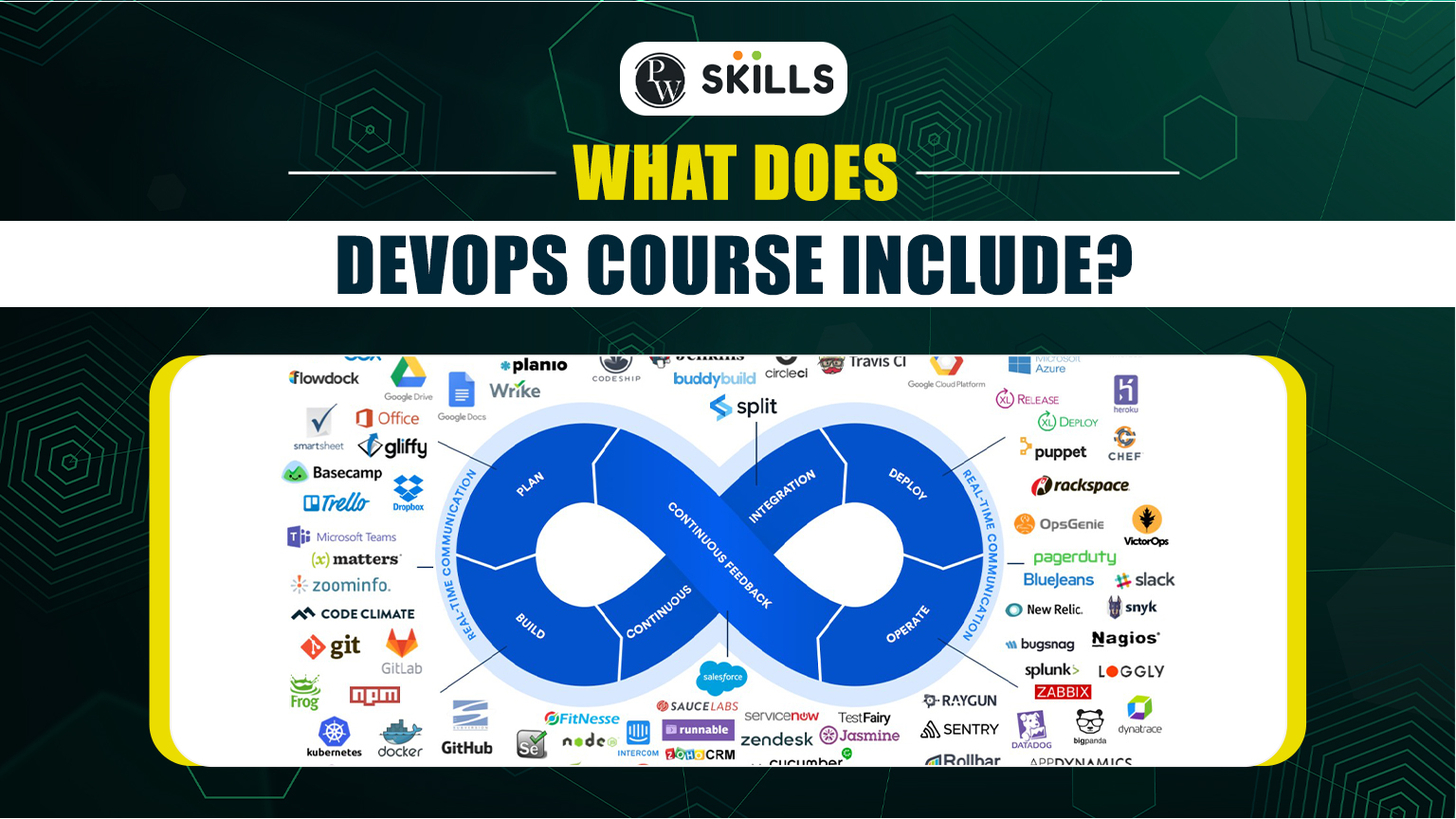Understanding what you’ll learn before enrolling in DevOps certification programs helps set realistic expectations and ensures program alignment with your goals. A comprehensive DevOps certification syllabus encompasses foundational concepts, containerization technologies, orchestration platforms, infrastructure automation, continuous integration/continuous deployment, and cloud platform expertise. This detailed breakdown explores the tools and technologies constituting typical DevOps certification syllabi, helping you understand the comprehensive skill set you’ll develop.
DevOps Certification Syllabus: Foundational Concepts
DevOps Philosophy and Culture
Effective DevOps certification syllabi begin with philosophical foundations before diving into tools.
DevOps principles: Collaboration between development and operations teams. Automation of repetitive tasks. Continuous measurement of system performance. Sharing responsibility for reliability and performance.
Cultural transformation: Breaking silos between departments. Establishing shared metrics and goals. Encouraging experimentation and continuous improvement. Building blameless incident response cultures.
Lean and agile integration: DevOps certification syllabi often cover lean principles reducing waste and agile methodologies enabling rapid iteration. Understanding how development practices influence operations informs infrastructure decisions.
Reliability engineering: Ensuring systems remain available and performing despite challenges. Balancing innovation velocity with system reliability. Managing technical debt and infrastructure modernization.
Linux Fundamentals
Linux proficiency underpins virtually all DevOps work. DevOps certification syllabi dedicate significant content to Linux mastery.
Command-line expertise: Terminal navigation, file operations, permissions management, process management. Comprehensive Linux command knowledge forms essential foundation.
User and system administration: User account creation and management, group administration, sudo configuration, system configuration files. Understanding system-level administration informs infrastructure automation.
Networking fundamentals: IP addressing, network interfaces, DNS resolution, firewall configuration, routing basics. Network understanding prevents infrastructure problems and enables troubleshooting.
Package management: Installing, updating, and managing software packages. Understanding dependency management and package repositories.
System services and daemons: Starting, stopping, and managing services. Understanding systemd and service dependencies. Managing service startup and shutdown.
System monitoring and logs: Understanding system health through monitoring tools and log files. Analyzing logs for troubleshooting. Understanding common log file locations and formats.
Programming and Scripting
While not requiring expert programmer-level skills, DevOps course ensure solid programming fundamentals.
Bash scripting: Writing automation scripts in Bash shell. Variables, control structures, functions, and error handling. Creating operational automation through shell scripts.
Python fundamentals: Python has become the de facto DevOps programming language. Variables, data structures, control flow, functions. Writing practical scripts for infrastructure automation and tool development.
Git version control: Essential for infrastructure code management. Repository initialization, committing changes, branching, merging. Collaborative development workflows with Git.
Configuration file formats: YAML, JSON, and XML prevalence in DevOps tools. Understanding how to read and write configuration files. Parsing and generating structured data.
DevOps Certification Syllabus: Containerization
Docker and Container Fundamentals
Containerization represents transformative technology in modern DevOps. DevOps certification syllabi dedicate substantial content to Docker mastery.
Container concepts: Understanding containerization advantages over virtual machines. Images as immutable application packages. Containers as running instances of images.
Docker architecture: Docker daemon, client, and registry relationships. Understanding how Docker manages containers and images.
Image creation: Writing Dockerfiles to automate image construction. Multistage builds for optimized images. Best practices for lightweight, secure images.
Container operations: Running containers with various options. Port mapping and networking. Volume management for persistent data. Environment variables and configuration.
Docker networking: Container-to-container communication. Bridge, host, and overlay network modes. DNS resolution between containers.
Docker Compose: Multi-container orchestration for development and testing. Service definition in compose files. Network and volume management with Compose.
Docker registries: Storing and distributing images. Public registries like Docker Hub and private registries. Image tagging and versioning strategies.
Best practices: Security scanning of images. Image optimization for size and build time. Logging and monitoring from containerized applications.
DevOps Certification Syllabus: Container Orchestration
Kubernetes
Kubernetes dominates container orchestration; most DevOps certification syllabi include substantial Kubernetes content.
Kubernetes architecture: Master/control plane components managing cluster state. Worker nodes running containerized workloads. Understanding cluster architecture informs deployment strategies.
Deployments and replicas: Declaring desired application state through Deployments. Replica management ensuring high availability. Rolling updates and rollback strategies.
Services and networking: Exposing applications through Services. ClusterIP, NodePort, and LoadBalancer service types. DNS-based service discovery within clusters.
Storage management: PersistentVolumes for durable storage. PersistentVolumeClaims for application storage needs. Storage classes for dynamic provisioning. Understanding storage trade-offs.
Configuration management: ConfigMaps for non-sensitive configuration. Secrets for sensitive data like passwords and API keys. Environment variable injection into pods.
Resource management: CPU and memory requests ensuring proper scheduling. Limits preventing resource contention. Quality of Service classes affecting eviction policies.
Monitoring and logging: Prometheus for metrics collection. ELK stack or similar for log aggregation. Understanding cluster health and application performance.
Security practices: Network policies restricting traffic. RBAC (Role-Based Access Control) for authorization. Pod security policies and security contexts.
Troubleshooting: kubectl commands for investigating cluster state. Debugging pod issues. Understanding common deployment problems.
DevOps Certification Syllabus: Infrastructure Automation
Infrastructure as Code
Infrastructure automation through code represents DevOps philosophy core. DevOps certification syllabi emphasize infrastructure as code deeply.
Terraform fundamentals: HashiCorp Configuration Language (HCL) syntax. Resource declarations and data sources. State management and backends.
Terraform modules: Creating reusable infrastructure components. Module composition and variable passing. Module best practices.
Terraform advanced topics: Workspaces for environment separation. Remote backends for state collaboration. Provisioners for additional configuration.
CloudFormation (AWS):AWS-native infrastructure as code tool. Templates defining infrastructure. Stacks for infrastructure grouping and lifecycle management.
Azure Resource Manager: Microsoft’s infrastructure as code approach. ARM templates and bicep language. Deployment and resource management.
Configuration management: Ansible, Chef, or Puppet for post-deployment configuration. Infrastructure consistency enforcement. Idempotency principles.
Version control for infrastructure: Git workflows for infrastructure code. Code review processes for infrastructure changes. Infrastructure change tracking and auditing.
DevOps Certification Syllabus: CI/CD Pipelines
Continuous Integration and Deployment
CI/CD automation represents central DevOps practice. Certification syllabi ensure pipeline expertise.
Jenkins fundamentals: Pipeline definition and stages. Build triggers and scheduling. Agent configuration for distributed builds.
GitLab CI/CD: YAML pipeline definition. GitLab Runner configuration. CI/CD best practices in GitLab.
GitHub Actions: Workflow definition for GitHub repositories. Actions marketplace for common tasks. CI/CD in GitHub ecosystem.
Cloud platform CI/CD: AWS CodePipeline, Azure Pipelines, Google Cloud Build. Cloud-native pipeline tools and integrations.
Pipeline design patterns: Build stages, test stages, deployment stages. Approval gates and manual interventions. Parallel execution and dependencies.
Testing integration: Unit tests in CI pipelines. Integration tests validating interactions. Deployment testing before production release.
Deployment strategies: Blue-green deployments minimizing downtime. Canary deployments reducing risk. Rolling updates for gradual transition.
Artifact management: Build artifact storage and retrieval. Version control for deployable artifacts. Artifact promotion across environments.
DevOps Certification Syllabus: Monitoring and Observability
System and Application Monitoring
Understanding system health through comprehensive monitoring forms essential DevOps responsibility.
Prometheus fundamentals: Time-series metrics database. Scrape configuration for metrics collection. Alert rules for anomaly detection.
Grafana dashboards: Visualizing metrics from Prometheus and other data sources. Dashboard creation and sharing. Alert notification management.
ELK Stack: Elasticsearch for log storage and search. Logstash for log processing. Kibana for log visualization and analysis.
Cloud platform monitoring: CloudWatch (AWS), Azure Monitor (Azure), Cloud Monitoring (GCP). Native monitoring tools integration with cloud infrastructure.
Distributed tracing: Understanding request paths through microservices. Jaeger or Zipkin for trace collection. Performance analysis through tracing.
Alerting: Alert rule definition and notification channels. On-call management and escalation policies. Alert tuning and false positive reduction.
DevOps Certification Syllabus: Cloud Platforms
Cloud Platform Expertise
Most DevOps certification syllabi emphasize cloud platform expertise specific to program focus.
AWS DevOps certification syllabus:
- EC2, ECS, Lambda for compute
- RDS, DynamoDB for data stores
- VPC and security groups for networking
- IAM for access control
- CloudFormation for infrastructure automation
- CodePipeline for CI/CD
- CloudWatch for monitoring
Azure DevOps certification syllabus:
- Virtual Machines for compute
- App Service for applications
- Azure Database for data stores
- Virtual Networks for networking
- Azure AD for identity
- ARM templates for infrastructure
- Azure Pipelines for CI/CD
- Azure Monitor for observability
GCP DevOps certification syllabus:
- Compute Engine for VMs
- App Engine and Cloud Run for applications
- Cloud Storage for object storage
- Kubernetes Engine for orchestration
- Cloud Build for CI/CD
- Cloud Monitoring for observability
- Service accounts and IAM for security
DevOps Certification Syllabus: Security
Security and Compliance
Modern DevOps certification syllabi emphasize security throughout rather than treating it separately.
Infrastructure security: Firewall configuration and network segmentation. Encryption in transit and at rest. Secure credential management.
Container security: Image scanning for vulnerabilities. Container runtime security. Pod security policies.
Access control: Identity and access management (IAM). Role-based access control (RBAC). Principle of least privilege.
Compliance and audit: Understanding regulatory requirements (HIPAA, PCI-DSS, SOC2). Audit logging and monitoring. Compliance automation.
DevOps Certification Syllabus: Soft Skills
Non-Technical Competencies
Advanced DevOps certification syllabi increasingly include soft skills recognizing human elements of technical transformation.
Communication and collaboration: Cross-team coordination and collaboration. Technical documentation. Presenting technical concepts to non-technical audiences.
Incident management: On-call responsibilities and escalation. Incident response during outages. Post-incident reviews and learning.
Change management: Planning infrastructure changes minimizing risk. Communication during maintenance windows. Rollback procedures.
Problem-solving: Troubleshooting complex infrastructure issues. Root cause analysis. Systematic debugging approaches.
DevOps Certification Syllabus Evolution in 2025
Modern DevOps certification syllabi increasingly emphasize:
GitOps practices: Using Git as single source of truth for infrastructure and application configuration. Declarative infrastructure management through version control.
Serverless architecture: Function-as-a-Service platforms and implications for DevOps. Reduced operations complexity through managed services.
eBPF and observability advancements: Advanced observability tooling and kernel-level instrumentation. Next-generation monitoring capabilities.
AI/ML operations: MLOps specialization integrating machine learning into CI/CD pipelines. Model versioning and serving infrastructure.
Sustainability and efficiency: Optimizing infrastructure for energy efficiency and cost reduction. Carbon footprint awareness in infrastructure decisions.
Conclusion
A comprehensive DevOps certification syllabus ensures mastery across containerization, orchestration, infrastructure automation, CI/CD, monitoring, cloud platforms, and security. The specific emphasis varies by certification type and provider, but this comprehensive skill set represents modern DevOps professional baseline knowledge. Understanding what you’ll learn through DevOps certification syllabus helps set expectations and ensures program selection aligns with your learning goals.
Whether pursuing AWS, Azure, GCP, or platform-agnostic certifications, the technologies and tools covered remain largely consistent—evolving containers, Kubernetes, infrastructure as code, and cloud platforms constitute the DevOps landscape. Master these tools through comprehensive DevOps certification syllabus, and you’ll possess expertise distinguishing you as a serious DevOps professional ready for career impact.









